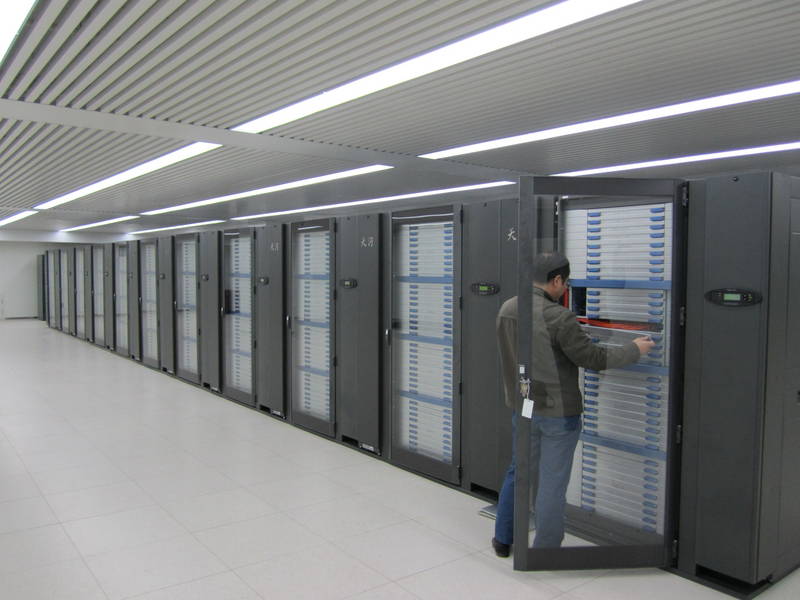U.S. Government Restricting Supercomputer Chip Exports To China
Four technical centers in China that are associated with the Tianhe-2, the world's most powerful supercomputer, were put on a list of restrictions by the U.S. government. According to the WSJ, the reason given is because these centers are acting "contrary to U.S. national security or foreign-policy interests."
The Tianhe-2 and the Tianhe-1A are both "believed to be used in nuclear explosive activities," according to a notice posted by the U.S. Commerce Department on February 18. However, designers for the Tianhe-2 said that the supercomputer is used for scientific research such as genome research.
Considering it's well known that China already has and continues to develop nuclear weapons as well as nuclear reactors, the reason given sounds quite strange. The Tianhe-2 supercomputer uses mainstream server chips from Intel, so it's hard to believe China couldn't find another way to gets its hands on those chips without having the four technical centers directly involved in acquiring them.
Right now, the export restrictions seem to refer only to those four centers and not to China as a whole, potentially making a bypass of these restrictions very easy. The four technical centers that are related to the Tianhe-2 supercomputer are located in Changsha, Guangzhou and Tianjin, and it also includes the National University of Defense Technology in Changsha.
The real reason could be that China has also increased its restrictions and demands for U.S. companies lately. One of the more recent demands is requiring companies to allow access to their software source code in order for the Chinese government to verify it for backdoors. The demand also includes adding ways to monitor their users and handing the government the private keys to encryption. U.S. companies, along with the White House, have decried the new requirements as invasive.
Horst Simon, a supercomputer expert and deputy director of Lawrence Berkeley National Laboratory, said that these restrictions could incentivize the Chinese to invest more heavily in developing their own chips locally.
Chinese companies already use architecture licenses for ARM or MIPS to build their own chips. Even if both ARM and Imagination were also banned by the UK government from licensing their architectures out to China, Chinese companies would still be able to keep the previous designs and continue to build on them.
Get Tom's Hardware's best news and in-depth reviews, straight to your inbox.
Follow us @tomshardware, on Facebook and on Google+.
Lucian Armasu is a Contributing Writer for Tom's Hardware US. He covers software news and the issues surrounding privacy and security.
-
clutchc Now I suppose the Chinese will stop exporting rare-earth metals to the US in retaliation. Aren't all the computer chips assembled in China anyway?Reply -
PotatoFlyer No, chips are made in specialized fabs around the world (Vietnam, Malay, Costa Rica, US, etc...)Reply
-
house70 "The real reason could be that China has also increased its restrictions and demands for U.S. companies lately. One of the more recent demands is requiring companies to allow access to their software source code in order for the Chinese government to verify it for backdoors. The demand also includes adding ways to monitor their users and handing the government the private keys to encryption. U.S. companies along with the White House have decried the new requirements as invasive."Reply
Oh, come on. Sounds like China is just trying to keep up with the NSA. -
Eximo Not sure how it is news that they've added to the list. Seems like business as usual. There are many CPUs and other type of chips that can't be exported to China and other countries. Some of them are just proscribed because they can be used to develop self guided weapons. Others for the ability for reasonably timely decryption capabilities.Reply
-
Doug Lord We need to embrace China and welcome them to a triparte with US and the EU. They are going to be a power. We need to be friends.Reply -
okcnaline Pah... Panthetic. This is merely the world powers just screwing with each other. Very panthetic. Expect World War III soon.Reply -
Durandul I'm sorry, but I really hope that any chip fabbers ignore this. All this is beyond dumb.Reply -
kenjitamura With China's lack of reverence for all things copyright I'm surprised they haven't already started building fabs to produce their own X86 chips. I mean yeah they'll be years or even decades behind AMD and Intel at first but they got to start somewhere and they could even start poaching retired and active engineers from AMD and Intel.Reply
